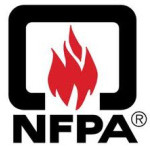- 産業: Fire safety
- Number of terms: 98780
- Number of blossaries: 0
- Company Profile:
Established in 1896, NFPA's mission is to reduce the worldwide burden of fire and other hazards on the quality of life by providing and advocating consensus codes and standards, research, training, and education.
A line that runs from the bow to the stern of the vessel and is equidistant from the port and starboard sides of the vessel.
Industry:Fire safety
A linear opening in or between adjacent assemblies that is designed to allow independent movement of the building.
Industry:Fire safety
A line-type detector comprising small-diameter tubing, usually copper, that is installed on the ceiling or high on the walls throughout the protected area. The tubing is terminated in a detector unit containing diaphragms and associated contacts set to actuate at a predetermined pressure. The system is sealed except for calibrated vents that compensate for normal changes in temperature.
Industry:Fire safety
A line-type or spot-type sensing element in which resistance varies as a function of temperature.
Industry:Fire safety
A lining or coating material that when applied to piping or appurtenances has the property of reducing or slowing the deterioration of the object’s surface or properties when exposed to its environment.
Industry:Fire safety
A liquefied compressed gas that under the charged pressure is partially liquid at a temperature of 68°F (20°C) and that is flammable.
Industry:Fire safety
A liquefied compressed gas that, when under a charged pressure, is partially liquid at a temperature of 68°F (20°C) and is flammable.
Industry:Fire safety
A liquefied gas extinguishing agent that extinguishes fire by chemically interrupting the combustion reaction between fuel and oxygen. Halogenated agents leave no residue.
Industry:Fire safety
A liquid fuel tank that, (a) if mounted on a trailer, extends outboard of the vehicle frame and outside of the plan view outline of the cab; or (b), if mounted on a motor home, extends outboard of a line parallel to the longitudinal centerline of the motor home and tangent to the outboard side of a front tire in a straight-ahead position. In determining whether a fuel tank on a trailer or motor home is side-mounted, the fill pipe is not considered a part of the tank.
Industry:Fire safety
